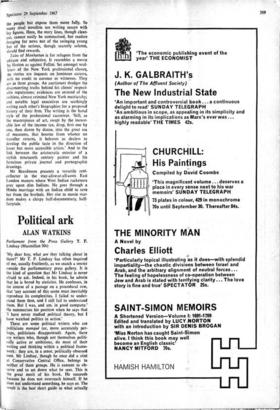Political ark
ALAN WATKINS
Parliament from the Press Gallery T. F. Lindsay (Macmi11an•30s) 'My dear boy, what are they talking about in there?' Mr T. F. Lindsay has often inquired of me, usually fruitlessly, as we snatch a smoke outside the parliamentary press gallery. It is the kind of question that Mr Lindsay is never afraid to ask. Indeed, in his book, he admits that he is bored by statistics. He confesses, in the course of a passage on a procedural row, that 'any account of this scene must inevitably reproduce its complexities. I failed to under- stand them then, and I still fail to understand them. But I was, and am, in good company.' He summarises his position when he says that 'I have never studied political theory, but I have watched politics in action.'
There are some political writers who are politicians manqué (or, more accurately per- haps, politicians disappointed). Again, there are writers who, though not themselves politi- cally active or ambitious, do most of their writing and thinking within a political frame- work: they are, in a sense, politically obsessed men. Mr Lindsay, though he once did a stint at Conservative Central Office, belongs to neither of these groups. He is content to ob- erve and to set down what he sees. This is the great merit of his book. He succeeds because he does not overreach himself. If he does not understand something, he says so. The result is the best short guide to what actually
happens in Parliament that is currently avail- able.
Not that Mr Lindsay neglects the recent literature, or omits to make suggestions for the future. Most of the latter strike me as being right. Mr Lindsay is, for instance, a strong supporter of specialist committees. But he points out, what other supporters have not pointed out, that the committees will fail unless their setting up is accompanied by a funda- mental change in the attitude of government towards back-benchers.
If I have one complaint, it is about Mr Lindsay's fondness for unapt metaphor. Thus the late Earl Alexander of Hillsborough is 'an irascible Christmas pudding.' But Mr Lind- say's liking for the food-and-drink metaphor is as nothing to the alacrity with which, on the slenderest of pretexts, he will establish an entire parliamentary Noah's Ark. In the course of four short paragraphs we have Mr Michael Foot and the left as 'cats'; then back-
benchers become 'fish . varying in scale and fin, swimming in different shoals'; and finally the Liberal party are 'birds in this tiny nest.' Still, it is all very readable.







































 Previous page
Previous page